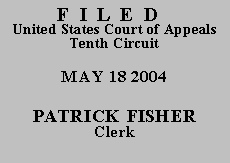

| JACOB LOUIS WASHINGTON, |
|
| v. | |
| JEFF KILLIAN; WARREN RAHN, |
therefore submitted without oral argument.
Plaintiff Jacob Louis Washington, a state prisoner in Colorado, is suing his parole officers, Jeff Killian and Warren Rahn, for money damages pursuant to 42 U.S.C. § 1983 for an alleged unconstitutional revocation of his parole. The gravamen of his claim is that he was "not given a proper hearing at the parole board." He claims that his parole was revoked because he was arrested on parole, but that the charges against him were subsequently dismissed.
As the district court correctly held, this suit is precluded by the Supreme Court's decision in Heck v. Humphrey, 512 U.S. 477 (1994). In Heck, the Court held that a suit by a prisoner for money damages under § 1983, which would necessarily imply the invalidity of his conviction or sentence, is precluded unless or until the underlying conviction or sentence has been reversed, expunged, or otherwise held invalid. Id. at 486-87. Because Mr. Washington's claim that his parole revocation was unconstitutional would necessarily imply the invalidity of his sentence, this case falls within the prohibition in Heck. As we have previously noted, the rule in Heck applies to "proceedings that call into question the fact or duration of parole or probation." Crow v. Penry, 102 F.3d 1086, 1087 (10th Cir. 1996) (per curiam) (citation omitted). Mr. Washington does not allege, and nothing in the record indicates, that his parole revocation has been invalidated. A suit for money damages is not the proper vehicle for challenging the validity of his parole revocation.
The judgment of the United States District Court for the District of Colorado is AFFIRMED.
Appellant's motion to proceed without prepayment of the filing fee is GRANTED. He is reminded that he is obligated to begin making partial payments toward the filing fee and to continue making partial payments until the entire fee has been paid.
Entered for the Court,
Michael W. McConnell
Circuit Judge
*.This order and judgment is not binding precedent, except under the doctrines of law of the case, res judicata, and collateral estoppel. The court generally disfavors the citation of orders and judgments; nevertheless, an order and judgment may be cited under the terms and conditions of 10th Cir. R. 36.3.